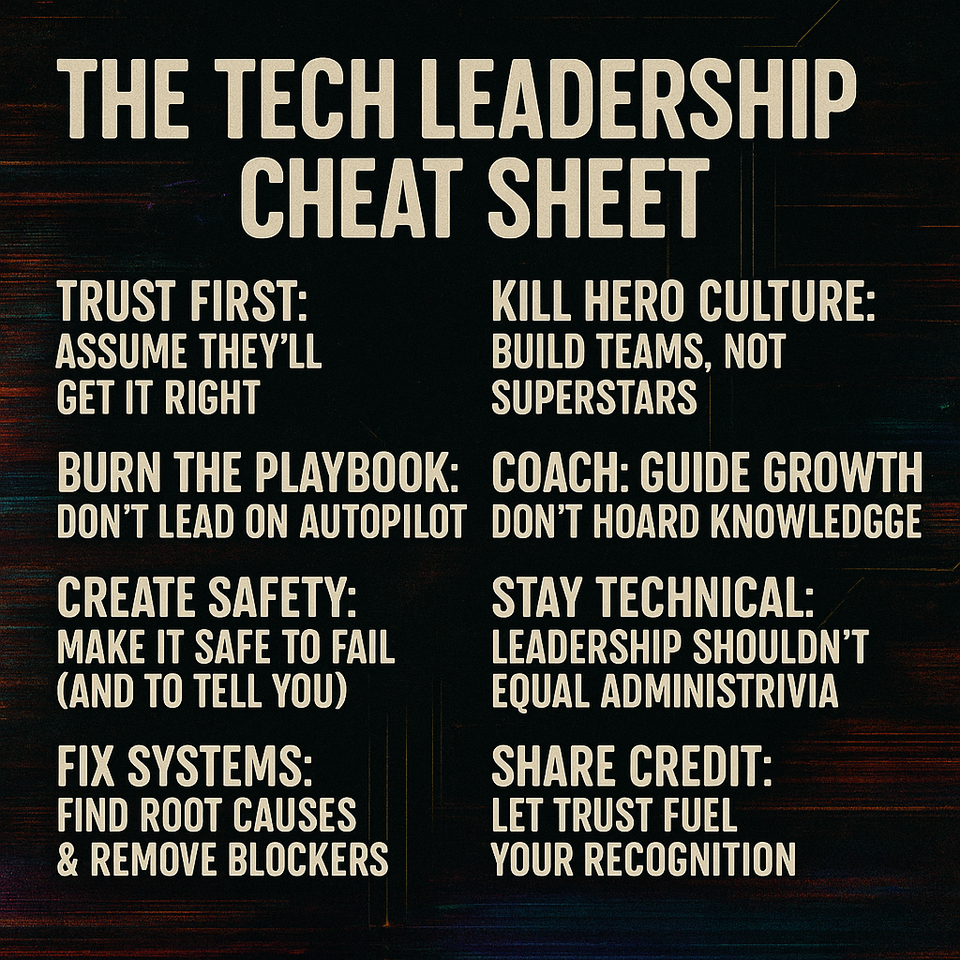Tech Leadership Guide

How to Be a Good Tech Leader (Without Becoming the Boss Everyone Hates)
The bar for tech leadership is low. Like, trip-over-it-on-the-way-to-another-meeting low.
Half of us got promoted because we could code fast. The other half got promoted because someone needed a warm body to run standup. Neither is leadership. Both are recipes for team damage if you don’t course-correct fast.
This post is for the engineers who just became leads and feel like frauds. For the people who want to step into leadership but don’t want to sell their soul. For the folks watching bad leadership above them and quietly promising themselves they’ll do better.
Let’s talk about how to actually lead in tech. No fluff. No corporate vibes. Just real, rebellious, people-first leadership that works.
1. Trust First, Always
If you walk into leadership assuming your team is lazy, broken, or needs constant supervision... congrats, you’re the problem.
Good leadership starts with trust. You give it before it's earned, because that's how people rise to the occasion.
Micromanagers burn teams out. Leaders who trust their people build teams that run without them.
“If you have to control everything, you don’t need a team. You need therapy.”
2. Burn the Playbook, Write Your Own
There’s no universal checklist for being a good leader. But I can tell you what doesn’t work:
- Copying your old boss
- Blindly following corporate training modules
- Acting like leadership is a title, not a responsibility
Your team isn’t a machine. They’re a group of complicated humans trying to do great work in a messy system.
Adapt. Throw out what doesn’t fit. Build something better. Then teach others to do the same.
3. Create Safety, Not Surveillance
Want people to speak up when something’s broken? Give them a culture where they won’t be punished for honesty.
Blameless postmortems. Celebrating vulnerability. Asking dumb questions on purpose just so others know it’s safe.
If your team hides problems from you, that’s not a "dev problem." That’s your culture talking.
"People don't fear failure. They fear the response to failure."
4. Fix Systems, Not Just People
It’s easy to blame individuals when stuff goes wrong. It’s harder to examine the system that let it happen.
Good leaders zoom out:
- Is onboarding broken?
- Are goals unclear?
- Are your processes slowing people down?
- Are you burning people out with unclear expectations?
Don’t just coach your team. Debug the environment.
5. Lead Loud. Listen Louder.
Be visible. Give praise publicly. Take blame privately. Make decisions, but make space for input.
And for the love of clean commits: listen more than you speak.
Leadership isn’t talking in meetings. It’s knowing when not to.
6. Kill the Hero Culture
You know the dev who saves the day every Friday at 4:59pm?
Cool. Now ask why they needed to.
Stop rewarding chaos. Stop celebrating burnout. Start designing systems where everyone can succeed, not just the ones who work unhealthy hours and thrive in fire drills.
"Don’t build around unicorns. Build around humans."
7. Coach. Don’t Command.
You’re not a cop. You’re a coach.
Ask questions. Offer context. Give guidance. And yes, give feedback—but in service of growth, not ego.
If you’re still giving orders instead of building understanding, you’re not leading. You’re babysitting.
8. Stay Technical (But Let Go)
You don’t need to be the smartest person in the repo. But you do need to:
- Understand the system
- Ask good technical questions
- Support good engineering decisions
Stay close to the work, without hogging the keyboard. Teach. Pair. Unblock. Then back off.
9. Show the Work. Share the Credit.
Brag about your team. Not yourself.
Highlight the junior who nailed the feature, because trusting early-career engineers enough to take real ownership is what turns potential into momentum. The dev who handled a tough outage. The person who mentored others quietly.
When your team looks good, you look good. Stop hoarding praise like it’s a resource.
10. Lead Like You’ll Leave
Want to know how strong your leadership is?
Ask yourself this:
“If I left tomorrow, would this team still thrive?”
If the answer is no, you’re not building leaders. You’re building dependence.
Document. Delegate. Develop others. Lead in a way that creates more leaders, not more work for yourself.
💡 Action step: Pick one responsibility you’re holding too tightly. Write it down. Teach it. Hand it off. Start practicing the kind of leadership that doesn’t need to be in the room to make an impact.
👊 Final Word
Being a great tech leader isn’t about control. It’s about clarity, trust, and the courage to do it differently.
Anyone can follow the handbook.
Real leaders rewrite it.
So go do that.
And if you ever feel like you're not "leading right" because you're not doing it the way your boss does?
Good. You're probably on the right track.
Hey, since you made it this far, you might actually care about becoming a better leader. Good news: I wrote an ebook that’ll help you skip years of trial and error.




